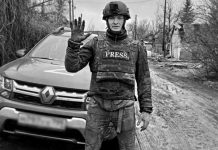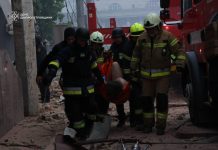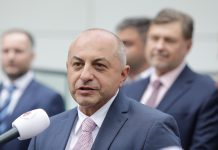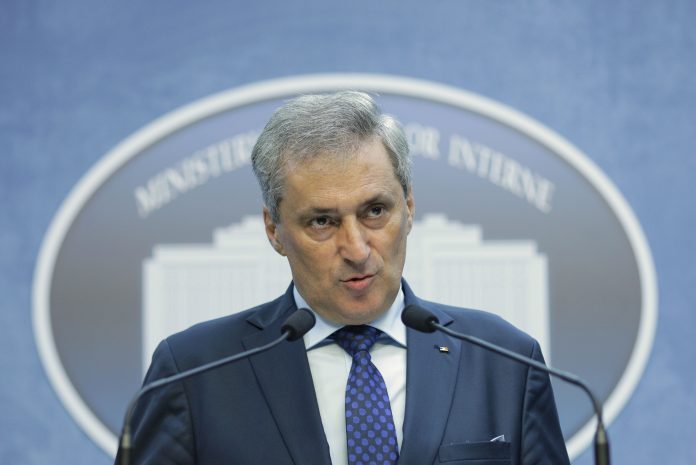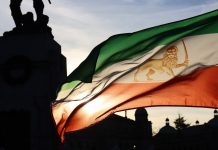Do you remember the 2000-2004 period when hardly a day passed without a message from Washington putting pressure on the government of Adrian Nastase to launch a real fight against corruption?
Do you remember the tensions between the two countries because even when by then the PM of Romania wanted to pretend he was tackling high-level corruption, afraid the Americans would get rid of him, he failed to do anything in the end because his clique was up to its neck in dirty business, and they sabotaged even the small steps taken in the right direction?
Well, though it seems almost improbable, if we take a look at the fast tracking of the partnership between U.S. and Romania, and the strong military cooperation and appreciation our President Klaus Iohannis enjoys at the White House, it is not out of the question that in the near future we’ll witness another strained period for bilateral relationships, with harsh statements, warnings and maybe even ultimatums.
This time too, it’s going to focus on corruption, but lower level graft which usually goes unobserved. It will be a major issue which Romania either doesn’t want to or isn’t capable of fixing itself. Though, just like with corruption, we should tackle it not just to do the Americans a favor but for our own good, in order to free thousands of people from poverty and an unacceptable lack of development for a EU and NATO member state.
But first things first.
There has never been so much good news for Romania from Washington in such a small time frame! The building of the 3rd and 4th reactors at Cernavoda as part of the extended partnership where Canada and France will also get involved, the impetus for building the Gdansk-Constanta road and rail corridor and the enhancement of the technical-military cooperation programs which come at a very important juncture of the US-Romania relationship. The one thing all these things have in common is substantial American investment.
The Cernavoda project is an 8 billion dollar project which EXIM, the US Export-Import Bank is committed to. Regarding the completion of the Romanian part for the corridor (Gdansk-Constanta) there aren’t that many details save for a prime one: American investors are almost certain to be involved.
Just as important is the way the technical-military cooperation between the U.S. and Romania is developing. And not just because we purchase more and more defensive and sophisticated equipment; but because Romania was granted access to the Risk Assessed Payment Schedule program under which we are allowed to pay for military equipment in installments and not with hard cash. This means that the U.S. agreed to take a financial risk with the arms exports.
Taken together, these developments clearly show a strengthening of the economic scale of the Romanian-American strategic partnership. We finally have some counterarguments to the old chestnut that Washington administration is merely interested in military and security cooperation, but doesn’t really want to invest here.
Unfortunately, Romania has one remaining problem, which if it isn’t fixed could block the previous projects together with many others which are still at the discussion stage. This is such a serious problem for the Americans that it could ruin their plans in our country. The issue is human trafficking.
According to the Trafficking in Persons Report (TIP) for 2020, drafted by the US Department of State, “Romania remains a primary source country for sex trafficking and labor trafficking victims in Europe. Traffickers subject Romanian men, women, and children to labor trafficking in agriculture, construction, hotels, manufacturing, and domestic service, as well as forced begging and theft in Romania and other European countries (….) Experts report a rise in Romanian women recruited for sham marriages in Western Europe; after entering these marriages, traffickers force the women into commercial sex or labor.”
This report doesn’t hesitate to point a finger at who’s to blame for the situation – ”The Government of Romania does not fully meet the minimum standards for the elimination of trafficking.” The performance of Bucharest administration is so deplorable to fight against the human traffic that we have been included, for the second year on end, on the second to last position for the most disgraceful category of countries in the world – ”Tier 2. Watch List.”
Among the countries in this category, which do not fulfill at least the “minimum standards” of fighting against human trafficking there are a number of African countries such as: Democratic Republic of Congo, Cameroon, Chad, Gambia, Mauritania, Nigeria, Senegal, Sudan, Tanzania, and Zambia. From Europe, only Ireland, Armenia, Azerbaijan and Bosnia- Herzegovina are in the same category.
In order to understand the seriousness of the assessment, we should note that Namibia is two places above Romania in State Department report, while Angola, Benin, Burkina Faso, Ivory Coast, Congo, Djibouti, Ethiopia, Ghana, Zimbabwe and many other countries are just one step ahead. Why is this the case?
”The government did not demonstrate overall increasing efforts compared to the previous reporting period. „
Authorities investigated, prosecuted, and convicted fewer traffickers. Alleged complicity in trafficking crimes persisted without punishment, particularly with officials exploiting minors while in the care of government-run homes or placement centers.
Authorities did not adequately screen for trafficking indicators or identify victims among vulnerable populations, such as asylum-seekers, individuals in commercial sex, or children in government-run institutions.
Services for child trafficking victims remained inadequate.
Moreover, a lack of sufficient government funding for assistance and protection services endured, leaving most victims without services, susceptible to re-traumatization, and at risk of re-trafficking. Therefore Romania remained on Tier 2 Watch List for the second consecutive year.”
If you haven’t got bored by now, and gone on to something more enjoyable than the export of prostitutes and beggars, maybe it’s time to ask yourself two essential questions concerning this topic: why are the Americans more worried about this topic than the West Europeans, as this is where Romania’s trafficked people end up? And how could Bucharest’s failure to tackle human trafficking block financing for the 3rd and 4th nuclear reactors or the military acquisitions program?
The answers are quite simple. The State Department’s Trafficked Persons’ report first appeared 20 years ago, following the passing of a bill to protect the victims of human trafficking – Trafficking Victims Protection Act (TVPA). At the heart of this law is the U.S. conviction that this scourge “represents a global threat which requires a global answer.” But also there was the moral imperative to combat modern slavery in all its forms, wherever it was worldwide.
The impact this report may have for Romania emerges clearly from several key provisions applicable for the countries within “Tier 3,” where we find Russia, China, Iran, Cuba, Afghanistan, Belarus and other states which either don’t want to or can barely do anything against the trafficking of a significant number of their citizens. Romania risks slipping down to the same “Tier 3” as early as next year if during the remaining months before the next report is drafted, there’s no significant progress on different tiers of this complex issue.
The rules of this report are very clear. One country cannot remain on “Tier 2. Watch List” more than 2 years, because in the third year it is automatically moved to level 3. Romania has already been on tier 2 in 2019 and 2020, which means that if the authors of the report don’t see a significant improvement in a short period, one that can be demonstrated with concrete actions and figures, next year we will enter the same category as the states mentioned above where there are only two European countries: Russia and Belarus.
How would Washington and other countries regard a NATO member when it is placed next to North Korea, Syria and Venezuela for an issue concerning its own citizens rather than any foreign policy issue?
The failure of the Romanian state to fight seriously against human trafficking won’t just be a question of image. It will cost us actual money and we will ruin the most important security relationship. The law which came as a result of the report clearly says that the U.S. will not provide any type of financial assistance for the countries in tier 3, except for some humanitarian assistance or relating to trade relations.
This means that should Romania be included in tier 3 there is a major risk of losing the 8 billion dollars for the two nuclear reactors in Cernavoda and the right to pay off military equipment in installments, as well as other potential financing we could benefit from to build parts of the corridor Gdansk-Constanta which crosses our territory.
In order to understand the gravity of the repercussions over the countries in Tier 3, it is only necessary to take a look at the obligations set for the President of the US through the Trafficking Victims Protection Act:
”(After the inclusion of a country in the Tier 3” – n.m.), the President will instruct the United States Executive Director of each multilateral development bank and of the International Monetary Fund to vote against, and to use the Executive Director’s best efforts to deny, any loan or other utilization of the funds of the respective institution to that country (other than for humanitarian assistance, for trade-related assistance, or for development assistance which directly addresses basic human needs, is not administered by the government of the sanctioned country, and confers no benefit to that government) for the subsequent fiscal year until such government complies with the minimum standards or makes significant efforts to bring itself into compliance.”
To put it plainly: the U.S. will use their power to block the access to funds for all the countries in Tier 3 that may be granted by such banks as: ”the International Bank for Reconstruction and Development, the International Development Association, the International Finance Corporation, the Inter-American Development Bank, the Asian Development Bank, the Inter-American Investment Corporation, the African Development Bank, the African Development Fund, the European Bank for Reconstruction and Development, and the Multilateral Investment Guaranty Agency.”
Of the banks on this list, it is enough to focus on the European Bank for Reconstruction and Development. The EBRD has invested almost 9 billion dollars in Romania covering 446 projects. Even a small blip with the EBRD brought about by U.S. opposition could have an enormous impact on Romania.
It is very hard to believe, given the excellent relations between Romania and Washington, that we could ever get to the point where the U.S. views Romania in the same light as Cuba, Venezuela or Syria. However, the solutions to avoid such a disastrous scenario aren’t to be found in America; they can only be found here in Romania. The capacity of the Washington administration to help us avoid slipping to tier 3 is somehow limited by other stricter provisions of the Trafficking Victims Protection Act.
The U.S. Department of State may help Romania from slipping into Tier 3, but just once. That is, if the 2021 report is detrimental for us, they can decide to grant a delay for one more year. But this will have to be based on an action plan devised by the interior and justice ministries and signed off by the Government. And if by 2022 we haven’t totally reversed our position, then nobody can stop Romania’s entry to the club of states which have failed over human trafficking.
Once there, all that could be done to save a solid cooperation depends on the U.S. President to invoke the strategic interest of his country with Romania in order to obtain a waiver from the sanctions exposed before and to continue some kinds of financing. But also this rescue for incompetent and/or corrupted administrations has its own limits.
The first one, which is actually the most important, is that the U.S. President can only seek a waiver once. After that nobody and nothing can prevent law enforcement, down to the letter of the law.
There is still a question whether Donald Trump, if he’s re-elected would agree to a plan forwarded by the Bucharest Government and would ask for such a waiver.
And the answer for now, is that he would rather not. That’s because Donald Trump has been extremely vocal in his support for the fight against human trafficking. For this reason, he engaged to crack down on the waivers given for the countries within tier 3. And he kept his word.
Trump is the first U.S. President who is totally involved, right to the end in putting pressure on countries which fail to fight human trafficking. His daughter, Ivanka Trump, wrote an op-ed on this issue and which should be read thoroughly by anybody who still believes that Romania has still got more than a year to prove that it is serious about its obligation to protect its own vulnerable citizens from traffickers. From this article they will read they are wrong.
They shouldn’t pin their hopes on Joe Biden either. On a statement made on July 30, the Democrats’ candidate for the White House adopted the same firm and uncompromising line about the phenomenon. And even if he would like to, if elected president, he will not be able to stop the legal mechanisms associated with the U.S. State Department report which are getting stricter and stricter with Romania and which risk jeopardizing the economic partnership with U.S. just when they are picking up speed.
And after all, why can’t Romania engage an efficient fight against this phenomenon? Why and for whom do we risk such a disastrous image, the loss of a great deal of money and a worsening our relations with the U.S.? I will lay out the criticism presented in the report. In every point we see the same combination of administrative incompetence and corruption to be found in all sectors.
The few correct and efficient measures, such as the extended confiscation initiative, promoted by Ana Birchall, amendment of justice laws proposed by Cătălin Predoiu or dismantling a mafia ring in which a police officer from the organized crime unit was involved seem to be buried under a heap of indifference and indolence. The National Agency against human trafficking – yes, we have such a state body – is just an empty shell. It almost doesn’t seem to exist, as it is underfunded and ignored. The National office for Witness protection, a key element within this war, has made his presence shown especially with corruption scandals and a failure to fulfill its duties to protect witnesses.
The Ponta and Dragnea Governments left their marks on the interior and justice ministries, the main bodies responsible for fighting human trafficking. If they wanted to undermine the U.S.-Romania relationship, making use of the mechanisms of the Report of the US Department of State, they fully succeeded.
However, the ministries are currently controlled by the National Liberal Party and however much they want to blame what they inherited from the Social Democratic Party, which even the U.S. Ambassador to Bucharest often mentions, the responsibility to repair what has been damaged is entirely their responsibility. And time is passing for changing institutions, attitudes and laws, things that need to be settled in a very short time, but we can’t see much progress. This means we are heading fast to a moment of crisis. Even the need of a waiver from the US State Department, to help prevent us being relegated to tier 3, would be a major failure for Romania.
On the surface there’s not going to be a crisis like there was during Adrian Nastase’s Government. There’s going to be a soft one, seen through carefully drafted statements, but no less serious. I state this again, as the problem isn’t going to be solved in Washington, but here in Bucharest! And for this purpose there’s going to be a serious pressure on the Romanian administration.
And as Ambassador Zuckerman keeps repeating,this is a sign that they know the truth there in Washington, we have come down this blind alley thanks to the Dragnea regime. Ana Birchall and some other high caliber professionals in the interior ministry had a very important contribution in preventing Romania being downgraded to “tier 2 watch list” even from 2018. Later on, nobody could do anything as long as Carmen Dan and Tudorel Toader had completely different priorities than combating the human trafficking, such as providing protection for all kind of offenders.
However, more than a year has passed since the new government took office and a deadline is looming for all the promises they committed to outlined in the U.S. State Department report. No matter how much compassion Washington has for the scale of issues to be solved in a short period of time, if they don’t see clear results their frustration will grow and finally burst. Anyone reading the last report carefully will notice there are several things that can be done swiftly.
The explosive element in this looming crisis is the conjunction between human trafficking issue and corruption. As long as the lack of progress is mostly attributed to bureaucratic incompetence and indolence, we may receive some support and even understanding.
But if things don’t start to move there will be serious questions whether the mafia „fees” for human trafficking handed to politicians and senior officials are the real cause for Romania’s failure, then things will take another turn. The need to relaunch the fight against corruption will return as an urgent matter, taking into account that it affects Romanians’ lives as well as the U.S. strategic interest of having a strong partner on the Black Sea they can rely on.
––––––––––––––––––––-
2020 Trafficking in Persons Report for Romania
U.S. Secretary of State Pompeo released the State Department’s 2020 Trafficking in Persons Report on June 25. This year marks the 20th anniversary of the TIP report and the introduction to the 2020 edition celebrates our progress in combating human trafficking. The goal of the report is to stimulate action and create partnerships around the world in the fight against trafficking in persons.
Romania: Tier 2 Watch List
The Government of Romania does not fully meet the minimum standards for the elimination of trafficking but is making significant efforts to do so. These efforts included identifying significantly more trafficking victims, participating in twice as many international investigations, and conducting more awareness campaigns. However, the government did not demonstrate overall increasing efforts compared to the previous reporting period. Authorities investigated, prosecuted, and convicted fewer traffickers. Alleged complicity in trafficking crimes persisted without punishment, particularly with officials exploiting minors while in the care of government-run homes or placement centers. Authorities did not adequately screen for trafficking indicators or identify victims among vulnerable populations, such as asylum-seekers, individuals in commercial sex, or children in government-run institutions. Services for child trafficking victims remained inadequate. Moreover, a lack of sufficient government funding for assistance and protection services endured, leaving most victims without services, susceptible to re-traumatization, and at risk of re-trafficking. Therefore Romania remained on Tier 2 Watch List for the second consecutive year.
PRIORITIZED RECOMMENDATIONS:
• Vigorously investigate and prosecute trafficking cases under the trafficking statute and punish convicted traffickers, including complicit officials, with significant prison sentences.
• Proactively identify potential victims, especially among vulnerable populations, such as migrants and asylum-seekers, individuals in commercial sex, and children in government-run institutions, through enhanced training for police officers and labor inspectors on recognizing indicators of exploitation.
• Significantly increase resources for, and the quality of, specialized victim services for children, including by training local child protection officers who work with victims and ensuring they have the necessary resources, such as funding.
• Amend legislation to allow for financial support to NGOs for victim services and develop and institute a formal mechanism for administering the funds.
• Expand efforts to train officials involved in judicial proceedings, particularly judges, on working with trafficking cases and victims, sensitivity to trafficking issues, and understanding all forms of trafficking.
• Increase the number of police officers investigating trafficking crimes and financial investigators specializing in trafficking cases.
• Significantly increase anti-trafficking training for law enforcement officials on working with victims, evidence collection, and understanding psychological coercion.
• Amend legislation to allow authorities to sanction recruiting agencies for crimes contributing to trafficking.
• Increase the quality of psychological counseling and improve access to medical assistance for victims.
• Amend regulations to exempt all trafficking victims who testify in trials from the online disclosure of their names to protect participating witnesses from retaliation and stigma and incentivize greater victim participation in prosecutions.
• Provide knowledgeable legal counsel and courtroom protections for victims assisting prosecutions.
• Revise the restitution mechanism to include minimizing court fees and increasing efforts to ensure victims receive reparation.
• Allocate adequate financial resources for the implementation of the 2018-2022 national strategy and national action plan.
PROSECUTION
The government decreased law enforcement efforts. Articles 210 and 211 of the penal code criminalized sex trafficking and labor trafficking and prescribed penalties of three to 10 years’ imprisonment, which were sufficiently stringent and, with respect to sex trafficking, commensurate with penalties prescribed for other serious crimes, such as rape. As in previous years, government data did not differentiate between cases exclusively related to trafficking or cases related to other crimes, such as pandering. The Organized Crime and Terrorism Investigation Directorate (DIICOT) and the Department for Combating Organized Crime (DCCO) were responsible for investigating and prosecuting trafficking cases. Authorities opened 532 new trafficking cases in 2019, a decrease from 695 in 2018 and 675 in 2017. Prosecutors indicted 347 alleged traffickers, compared with 399 in 2018 and 362 in 2017. Courts convicted 120 traffickers in 2019, continuing a multi-year decline from 130 in 2018 and 222 in 2017. Although 37 convicted traffickers received suspended sentences, and three postponed prison sentences, the remaining 80 traffickers received sentences from one to more than 10 years’ imprisonment. During the reporting period, a court acquitted 25 alleged traffickers in the notorious “Tandarei” child trafficking case, in which the court tried the alleged traffickers under a law that provided lesser penalties and a shorter statute of limitations. The case resulted from a 2009-2010 joint investigation with the United Kingdom (UK) into a Romanian trafficking network, which Europol considered one of the biggest in Europe; the traffickers recruited hundreds of children from poor Roma communities in the southern part of the country and exploited them in the UK in forced begging or forced theft. In 2019, DIICOT and DCCO participated in 80 joint investigative teams with European counterparts, a significant increase from 36 in 2018 and 44 in 2017. In July 2019, Romanian and German authorities partnered in an investigation that resulted in the arrest of four Romanian men for exploiting minors, including their own children, in commercial sex. Romanian authorities also participated in a pan-European case led by Europol involving child trafficking, which resulted in 34 arrests.
Widespread complicity and the failure to incriminate officials hampered effective law enforcement. While the government did not collect data on complicit officials, NGOs, journalists, and human rights activists reported alleged complicity in trafficking crimes by government officials, particularly with officials exploiting minors and acting as accomplices to traffickers. In May 2019, DIICOT indicted the former police chief of a southeastern Romanian town for allegedly protecting a trafficking network while leading the local police inspectorate. The media reported a transnational trafficking network used bribes and pressure to induce the police into hiring an officer to serve in the General Police Inspectorate. The media also mentioned traffickers negotiated other jobs and transfers within the police force and offered the police information about rival criminal groups in order to eliminate their competitors. Additionally, several NGOs expressed suspicion that staff working in placement centers for minors and residential centers for persons with disabilities facilitated trafficking in persons. Nonetheless, the government did not report any investigations, prosecutions, or convictions of government employees complicit in trafficking offenses.
A new administration came into office in November 2019 and committed to reforming judicial structures; however, existing law enforcement deficiencies and knowledge gaps impeded progress. Authorities often charged suspected traffickers for crimes other than trafficking, such as pandering and pimping. DCCO continued to operate with limited staff due to provisions adopted by the previous government on the early retirement of police officers, which required 30 percent of the workforce to retire in 2018. As a result, overextended officers handled multiple cases simultaneously and struggled to build strong cases for prosecutors. Moreover, anti-trafficking efforts varied across the country, with some counties maintaining fewer staff and resources than other counties. Furthermore, authorities reported a lack of investigative tools and software that would allow them to perform faster and more effective online investigations. Additionally, observers reported that a split reporting structure hindered police efficiency and coordination with investigations and prosecutions. Likewise, NGOs noted that limited dedicated financial investigators—eight covering the entire country—restricted financial investigations and asset seizures, inhibiting evidence collection in trafficking cases to corroborate witness testimony. NGOs reported, while the legal sphere developed some sensitivity to trafficking victims’ situations, some police officers and judges continued to lack specialized training and sensitivity toward sex trafficking cases and trafficking issues, including a basic understanding of trafficking. Additionally, observers frequently criticized police and members of the gendarmerie, particularly in rural areas and small towns, for being unaware of the exploitation potential in commercial sex, leading to a failure to check for indicators of force, fraud, or coercion when encountering individuals in commercial sex. The government continued to use donor funding to train police and prosecutors to organize a series of anti-trafficking training programs during the reporting period. The National Institute for Magistrates conducted a workshop on international judicial cooperation and techniques for investigating trafficking, identification, referral, and assistance; 14 prosecutors and judges participated. The National Anti-Trafficking Agency (ANITP) organized 160 trainings for government, judiciary, and front-line officials on a victim-centered approach in criminal cases and victim identification and assistance. The Border Police General Inspectorate organized three trainings for 15 border police officers that focused on working with vulnerable persons and combating trafficking.
PROTECTION
The government maintained insufficient protection efforts. Public officials and NGOs identified 698 victims in 2019 (518 sex trafficking; 138 labor trafficking, including forced begging and forced theft; and 42 victims of attempted trafficking), an increase from 497 in 2018 and 662 in 2017. These statistics included victims from ongoing investigations and prosecutions initiated in previous years. Of these victims, 327 were minors. As in past years, fewer than half of identified victims received assistance. In 2019, 49 percent (339) of identified victims received assistance from public institutions, public-private partnerships, and NGOs, compared with 48 percent in 2018 and 46 percent in 2017. Authorities used the existing national victim identification and referral mechanism to identify and refer victims. While ANITP drafted a new mechanism in 2018 with the support of NGOs, the government did not implement it during the reporting period. Observers reported authorities did not proactively identify victims, particularly among vulnerable populations, such as individuals in commercial sex. They also noted authorities did not identify victims in key places such as placement centers, and identification typically occurred after a criminal investigation started. Consequently, NGOs claimed the actual number of victims was higher than the reported number. Observers also reported authorities fined persons in commercial sex, even if they were minors, without looking for trafficking indicators.
Based on information gathered during the identification process, authorities informed victims of the services available to them, after which victims decided the services they preferred and consented to the referral process. Authorities referred identified adult victims to ANITP and minor victims to child protection services. Victims received protection and assistance services in government-run facilities and in NGO-run trafficking shelters. The government maintained three government-run shelters designated for trafficking victims with the capacity to accommodate 18 adults; the shelters also housed domestic violence victims. Authorities placed child victims in general child facilities or in facilities for children with disabilities run by child protection services. Despite children representing 47 percent of identified victims, these shelters did not offer specialized services and frequently re-traumatized children. The National Authority for the Protection of Children’s Rights and Adoption (ANPDCA) reported that child protection services in most counties did not have the expertise and resources to offer services tailored to the special needs of trafficking victims. ANPDCA also reported local child protection services, which were supposed to provide service to trafficking victims, lacked the necessary knowledge that would allow them to justify funding requests for specialized services. Child protection services managed only two centers that focused specifically on child trafficking victims. Perennial problems of abuse and neglect of institutionalized children, coupled with the lack of proactive identification in government facilities, left children in placement centers vulnerable to trafficking. In 2019, authorities identified no foreign victims among refugees and asylum-seekers, but observers estimated there were dozens of cases. The law permitted foreign victims to request asylum and granted asylum-seekers the right to work after three months. The law also permitted foreign victims who cooperated with authorities to receive a renewable, six-month temporary residence permit. Romanian victims abroad received free travel documents issued by Romanian embassies; however, the government did not pay for repatriation expenses, resulting in NGOs and an international organization having to absorb the costs.
Nonexistence of government funding for NGO assistance and protection services remained a problem. While the government relied on NGOs to accommodate and assist victims, it did not allocate grants directly to NGOs due to legislation precluding direct funding. The government did not impose mandatory minimum standards on the quality of victim assistance, and as a result, assistance varied greatly depending on the facility. The law entitled all victims to psychological and medical care; however, the government did not provide more than one mental health counseling session and did not finance medical care costs. NGOs paid for all psychological services costs for victims due to the government’s refusal to reimburse psychologists who assisted victims. NGOs also covered victims’ emergency medical care costs because the government lacked financial assistance, and medical care required payment upfront. Moreover, access to medical care required Romanian victims to return to their home districts to obtain identity documents. The process presented logistical and financial hurdles for many trafficking victims; NGOs also covered those costs.
In general, victims lacked adequate support during criminal cases. In 2019, 255 victims participating in criminal proceedings accessed services available to victims assisting law enforcement; these services included concealing victims’ identities, protection at victims’ residence, and transporting victims during travel. While the government provided legal aid to victims, the lawyers assigned often lacked experience working with trafficking victims. Additionally, the government published the names of all trial witnesses, including minors, on the internet, putting victim-witnesses at risk of retaliation. The law entitled victims to reparation from their traffickers; however, victims generally could not afford the fees necessary to initiate civil trials or, in cases in which judges ordered restitution, to pay court officers to collect the money owed from traffickers. However, if victims did not obtain restitution in court, the government could reimburse for expenses related to hospitalization, material damage caused by the traffickers, and revenues victims lost while being trafficked.
Furthermore, in the event traffickers’ assets were not seized but a guilty verdict was reached, the government could pay material damages for documented expenses, such as medical bills.
PREVENTION
The government marginally increased prevention efforts. The government continued to implement its 2018-2022 national strategy and national action plan, but it did not allocate financial resources to any of the activities or goals. ANITP continued to publish yearly reports and statistics on trafficking and organized 85 awareness campaigns, compared with 36 in 2018, aimed at educating youth and adults looking for jobs abroad. Several NGOs criticized ANITP for investing too many resources in awareness campaigns and neglecting the pressing needs of victims.
Furthermore, NGOs expressed concern about ANITP’s capabilities, noting its limited capacity, decrepit infrastructure, and lack of authority, funds, and support from the government. The government made efforts to reduce the demand for commercial sex acts, including awareness campaigns aimed at educating purchasers on the role and demand of sex trafficking in commercial sex. In 2019, the General Inspectorate for Immigration conducted information sessions for asylum-seekers and foreign citizens studying in Romania about work regulations and the duties of employers. While the criminal code prohibited Romania-based recruitment companies from facilitating the exploitation of citizens abroad, the government did not have the power to punish recruitment agencies for crimes that contribute to trafficking, such as illegal recruitment fees. According to some NGOs, police remained unresponsive to reports of labor trafficking, and labor inspectors lacked the competency for detecting trafficking and the legal authority for unannounced inspections to several categories of worksites. Despite these shortcomings, the government issued 22,000 work permits for non-EU migrants, which put them particularly at risk for trafficking. ANITP managed a 24-hour hotline but only staffed an operator during regular business hours. The hotline provided services in Romanian and English and primarily focused on informing Romanians about working abroad safely. In 2019, the hotline received seven calls, compared with 13 in 2018, regarding potential trafficking cases, four of which DCCO investigated.
TRAFFICKING PROFILE
As reported over the past five years, human traffickers exploit domestic and foreign victims in Romania, and traffickers exploit victims from Romania abroad. Romania remains a primary source country for sex trafficking and labor trafficking victims in Europe. Traffickers subject Romanian men, women, and children to labor trafficking in agriculture, construction, hotels, manufacturing, and domestic service, as well as forced begging and theft in Romania and other European countries. Traffickers subject Romanian women and children to sex trafficking in Romania and other European countries. Experts report a rise in Romanian women recruited for sham marriages in Western Europe; after entering these marriages, traffickers force the women into commercial sex or labor. Minors represent nearly 50 percent of identified trafficking victims in Romania. Traffickers subject institutionalized children, particularly girls living in government-run homes and placement centers for disabled persons, to sex trafficking. Traffickers subject Romani children, as young as 13 years old, to forced begging and sex trafficking. The extent of trafficking from the Republic of Moldova into and through Romania is unclear, though some reports suggest that traffickers operating in Romania and Moldova exploit Moldovan women and girls from Romania in operations in Europe. Romania is a destination country for a limited number of foreign trafficking victims, including migrants from Africa, Europe, and South and Southeast Asia, exploited in the construction, hotel, and food-processing industries.
You can read the entire 2020 TIP report at https://www.state.gov/wp-content/uploads/2020/06/2020-TIP-Report-Complete-062420-FINAL.pdf(.PDF file, 47,3 MB).


